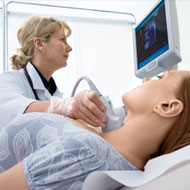- General Articles
- General Pregnancy Questions
- Baby Growth
- Pregnancy Diet
- Miscarriage
- During Pregnancy
- Twin Pregnancy
- Toddler Meals
- Home Remedies During Pregnancy
- Breastfeeding
- Pregnancy Week By Week
- Pregnancy Tests
- Ectopic Pregnancy
- Pregnancy Signs and Symptoms
- Pregnancy Stages
- Potty Training
- Fetal Development
- Preschooler
- Postpartum Depression
- Toddler Illness
- Baby Care
- After Pregnancy
- Molar Pregnancy
- During Delivery
- Beauty and Style
- Pregnancy Clothing
- Preconception
- Fertility
Post Pregnancy Hypothyroidism
Post Pregnancy Hypothyroidism Pregnancy can be one of the most joyful times in a woman’s life but with it can also come exhaustion, additional responsibilities and demands, and unpredictable schedules.
Hypothyroidism post pregnancy is part of what is known as postpartum thyroiditis, is an inflammation of the thyroid gland after delivery and pregnancy. Postpartum thyroiditis is when the thyroid gets swollen and inflamed, amounts of the inflamed thyroid gets dumped into the mother’s bloodstream. After the stores of thyroid are used up, the inflammation of the thyroid gland stops the normal production of the thyroid hormone causing the patient to go through hypothyroiditis.
Postpartum hypothyroiditis is usually the last stage in postpartum thyroiditis. It normally begins with hyperthyroidism, after which the thyroid may return to normalcy or progresses into hypothyroidism. Postpartum hypothyroidism is said to be due to the alterations to the immune system.
Postpartum hypothyroidism is usually self-limiting but it can proceed to permanent hypothyroiditis if conventional antibodies are found, although it may be comforting to know that postpartum hypothyroiditis is a resolvable type of thyroiditis. The three main causes of postpartum thyroiditis are:
- A case of the hypothyroid phase alone
- A hyperthyroid phase that returns to normal thyroid functioning
- A hyperthyroid phase that is followed by hypothyroidism
Studies have shown that certain Thyroperoxidase Antibodies or TPOab are often present in the bloodstream of women suffering from postpartum thyroiditis, in fact it was observed that nearly 30 to 50 percent of women who had TPOab in their bloodstream in the first trimester of their pregnancy developed postpartum thyroiditis. Women who do not have TPOab can also develop postpartum thyroiditis which is quite uncommon. Postpartum thyroiditis occurs in about five to ten percent of women post giving birth.
Symptoms of postpartum hypothyroidism
Postpartum hypothyroidism symptoms tend to be fleeting and can happen at any time during three to twelve months time post pregnancy. The common signs of hypothyroidism post pregnancy are:
- Poor memory
- Low energy levels
- Carelessness
- Dry skin
- Intolerance to cold
- Trouble concentrating
- General aches and pains
It can be said that if there is enough damage to the thyroid gland during the hyperthyroid phase, the production of the thyroid hormone may not be sufficient, resulting in hypothyroidism. Some women may not go through the hyperthyroidism stage at all but may directly enter the hypothyroidism phase. Research has shown that almost 25 to 30 percent of women with postpartum thyroiditis eventually develop postpartum hypothyroidism.
You can measure thyroid hormone levels in the blood in order to diagnose the hypothyroid phase. Low TSH (thyroid stimulating hormone) levels and high levels of T4 is indication of hyperthyroidism.
Some high risk factors for postpartum hypothyroidism are:
- High levels of antithyroid antibodies in the first trimester
- History of post pregnancy thyroiditis after previous pregnancies
- Type 1 diabetes
- History of autoimmune thyroid disease in the family
- If the patient has a goiter
Treatment for postpartum hypothyroidism
Treatment for this condition depends on the hormone abnormality levels as well as how severe the symptoms are. Medical care experts usually prescribe levothyroxine which is a synthetic thyroid hormone that helps re-establish hormone levels. This pill is advised by doctors to be taken once a day for close to six months, it is not considered unsafe to take when breastfeeding as very little amounts enter the milk. Health care professionals will want to test if the hypothyroidism is permanent or temporary by stopping the levothyroxine for about four to six weeks to test T4 and TSH levels. This pill will have to be taken by women for a lifetime if they get diagnosed with permanent hypothyroidism.
A thyroid gland that functions well is not only important to everyone but more so to women who are in their child bearing age. It is essential for a woman to have a clear thyroid status as it could affect the health of the children she bears. Studies have shown that women with low amounts of the thyroid hormone can affect their child’s intelligence levels. It can also have adverse effects on energy levels that may already be low when getting used to a new-born, worsening tiredness and fatigue.
It is important to remember that women who have had postpartum hypothyroidism are prone to develop a recurrence of the problem during the next pregnancy, in times of stress or during menopause or perimenopause.
Read more articles from the After Pregnancy Category.



 7 Must-Haves Before Your Baby Arrives
7 Must-Haves Before Your Baby Arrives Bonding Games for Babies
Bonding Games for Babies DIY Baby Bath Towel Apron
DIY Baby Bath Towel Apron Common Late Pregnancy Fears
Common Late Pregnancy Fears